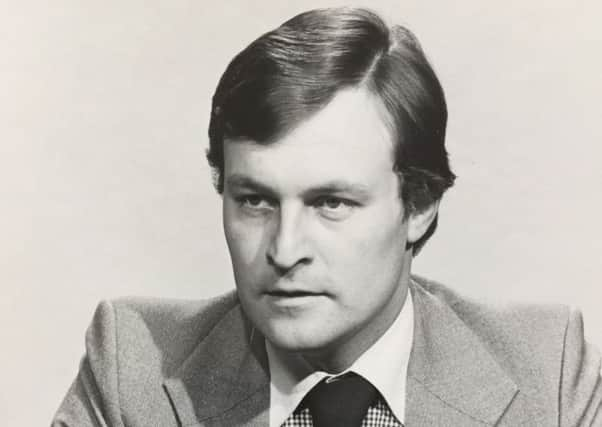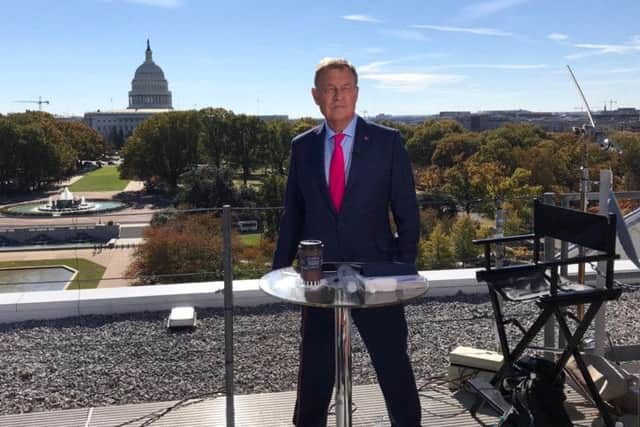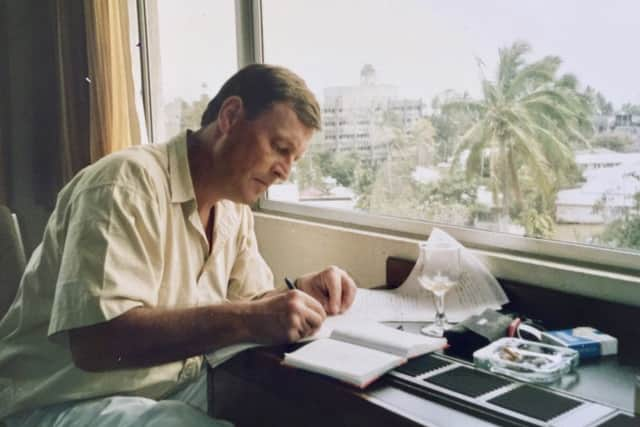Star Interview: How broadcasting in Sheffield was an industrial education for news anchor Jeremy Thompson


Jeremy went on to report for Look North, became the BBC’s first northern correspondent and travelled the world with ITN as a foreign correspondent.
He retired last year following a long stint at Sky, where he pioneered the art of presenting from the frontline, in the thick of dramatic events such as wars, murder inquiries and US elections.
Advertisement
Hide AdAdvertisement
Hide Ad

But joining BBC Radio Sheffield in 1971, and covering city life against a background of strikes and political turmoil, gave him the grounding he needed to scale the journalistic heights documented in his new autobiography, ‘Breaking News’.
Jeremy grew up in the Home Counties and went to school in Sevenoaks – he briefly dabbled in chartered surveying and advertising, but decided neither field was for him. Instead he trained as a reporter, learning the ropes at the Cambridge News before swapping papers for radio.
The timing was perfect. Local radio was in its infancy – Sheffield was one of the first stations to start – and offered a valuable route into broadcast news that was previously unavailable to ambitious types like Jeremy.
Regular summits with the miners’ union leader Arthur Scargill, days spent on picket lines and interviews with prominent city councillors such as David Blunkett were Jeremy’s stock in trade at Radio Sheffield, but he had to turn his talents to whatever was required – acting as a DJ and running quiz shows included.
Advertisement
Hide AdAdvertisement
Hide Ad

“I don’t think many youngsters would get the chance to do what I did again,” says Jeremy, who thinks taking the ‘long climb’ up through local newspapers, radio and TV is a thing of the past in an era of coveted internships and degree courses.
“Frankly, if you want to get into national news, the chances are unless you’ve got a decent degree they won’t even open the envelope to look at you.”
At ITN and Sky, Jeremy worked on stories with global impact – the conflicts in Iraq and Kosovo, the September 11 terror attacks and, latterly, Donald Trump’s advance on the White House.
However, local news – what he calls ‘grassroots stories’ – still reigns supreme, he believes.
Advertisement
Hide AdAdvertisement
Hide Ad

“One of the problems you find as you go up the ranks and end up at national level, whatever the medium you’re in, you get further removed from the spring where the story emanated from and you become secondary and tertiary processors. You’re re-working it, rather than tapping it and being close to it. You become a bit more remote.”
Covering events in South Africa, coinciding with the end of apartheid and Nelson Mandela’s journey from prison to the presidency after spending 27 years incarcerated, ranks as his career highlight. He ended up knowing Mandela pretty well, and they were on first-name terms.
“He was undoubtedly the most impressive and charismatic man I ever met or encountered as a journalist.”
Trump, meanwhile, is a trickier character. His off-the-cuff tweets have huge implications, Jeremy argues.
Advertisement
Hide AdAdvertisement
Hide Ad

“Maybe we are seeing a new world order of politics and diplomacy where people do use Twitter and other social media. It certainly isn’t raising the quality of debate. I always hoped to end my career with a bang rather than a whimper.
“But none of us could ever have suspected that bang would be the sound of Donald Trump marching into the White House. It was an extraordinary election.”
While Trump has been accused – and has accused others – of peddling ‘fake news’, Jeremy is not convinced a new phenomenon has emerged.
“It’s just the latest reincarnation of misinformation and propaganda that mankind has used since the earliest of days. It’s more instantaneous because it’s online, which then makes it more difficult for us in the mainstream media to challenge and correct it.
Advertisement
Hide AdAdvertisement
Hide Ad“The mainstream media has a battle royale on its hands to keep getting the straight, objective, impartial, honest truth out there as best we can. I sit back at the end of my career with interest to watch how the next generation of journalists handle it.”
Jeremy, aged 70, now lives in south-west London with wife Lynn. “I can walk to Twickenham to go and watch rugby – it’s that near,” he jokes. He has two grown-up sons and four grandchildren.
His book’s title, incidentally, comes from another innovation he helped to introduce – the idea of displaying a ‘breaking news’ strapline on the screen of Sky’s rolling TV service when a story came in.
“The phrase has become a bit debased, because everyone uses ‘breaking news’ and sticks the tag on everything. Maybe we’re past the golden age,” he says.
Advertisement
Hide AdAdvertisement
Hide Ad“I think we’re in a much more multifaceted world – where television news fits in, it’s difficult to tell. Everybody’s after video content and I still think television news is the best way of generating it.”
Last week Disney announced its plan to buy most of Rupert Murdoch’s 21st Century Fox, including Sky News.
It has been speculated the new owners might choose to shut the channel rather than continue investing in the loss-making venture.
“I’d be very sad to see it close down,” says Jeremy.
“I think it’s been one of the best news developments of the past quarter of a century. It’s a very accessible way of getting your news.”
And is he missing the buzz of live TV journalism?
Advertisement
Hide AdAdvertisement
Hide AdApparently not – apart from feeling a ‘little tweak’ when the Zimbabwean leader Robert Mugabe was toppled.
“It was my old patch, I’d met and interviewed Mugabe – I thought ‘I’d love to have been there and reported on this’.
“It’s a piece of history. Other than that I’m coping pretty well. It’s my first gap year in 50 years.”
Breaking News is out now, published by Biteback, priced £20 in hardback.
‘It does you good to be scared’
Advertisement
Hide AdAdvertisement
Hide AdAs a TV news reporter Jeremy Thompson dodged bullets and bombs in war zones but claims he always managed to stay detached enough to tell the story.
He was the first person to broadcast live as British peacekeepers entered Kosovo in 1999, and delivered a bulletin while being ‘buzzed’ by missiles in Iraq in 2003.
“Frankly it does you good to be scared. I always thought the moment I should get worried about it was when I didn’t feel scared any more. You want to be frightened, you need the adrenaline pumping so that you’ve got your wits about you in dangerous situations.
“Me and my camera crews would try and assess the risks as carefully as possible as we went along. But if something needs reporting you sometimes need to take risks and chances.
Advertisement
Hide AdAdvertisement
Hide Ad“You find out early on whether you can cope with it or not. It could be quite easy to get overdramatic or emotional when you’re under fire. I always thought ‘Get a grip mate, tell the story and stop worrying about the bits flying around’.”